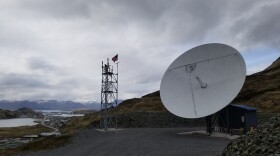
Hope McKenney
News DirectorHope McKenney is a public radio news director, reporter, producer and host based in the Aleutian Islands, Alaska.
Born in rural Northern California, Hope started as a reporter and producer at KZYX in Mendocino County. She's also worked for WBAI in New York and KQED in San Francisco.
In 2019, she moved to Unalaska/Dutch Harbor, Alaska, to work for Alaska's Energy Desk and KUCB — the westernmost public radio newsroom in the country. Hope has lived, worked and filed stories from California, New York, Bolivia, Peru, Cuba and Alaska.
-
The new strain of bird flu that arrived in Alaska with the spring migration has now been detected in a fox that died in the Aleutian Islands; a bill awaiting Gov. Mike Dunleavy’s signature has some Alaska seafood processors thinking of expansion; and Alaskans will soon be able to reach a suicide prevention hotline by calling a three-digit number instead of a ten-digit number.
-
Private George Fox — the only Unangax̂ soldier killed fighting in World War II and any war since — was finally honored for his sacrifice in a special Memorial Day celebration; early and absentee in-person voting began Friday for the U.S. House special primary election; and a panel of health and local officials will answer questions and talk about ways to improve Unalaska's healthcare system.
-
Unalaska teachers will get an 8% bump in their salaries over the next three years; the Unalaska City Council approved a collective bargaining agreement with the union that represents many of the city’s workers on Thursday morning; and as COVID-19 cases continue to rise in the state, health officials are encouraging Alaskans to renew their efforts to protect adults over 70.
-
Around 80 people showed up in front of City Hall Tuesday night, waiting to hear if the Unalaska City Council would approve new contracts for city workers; representatives from the Unalaska Native Fishermen’s Association are hoping to start a new fishery for smaller boats that they say would make it easier for more local boatowners to fish cod in the waters around the island; and a new whale identification program uses artificial intelligence to identify humpbacks by their flukes.
-
Alaska businesses hurt by the COVID-19 pandemic have until next Friday to apply for a second round of federal funding; the state takes steps to address school drop-out rates by putting education plans in the hands of tribes; and Yupik dance performances headlined the Cama’i Dance Festival in Bethel.
-
A local internet provider that has previously only offered WiFi to Unalaskans announced last month that it's launching a new LTE service. The island now has three options for cell service, and OptimERA is one of them.
-
Unalaska Public Library moved into its temporary location at the Burma Road Chapel last week, and while some things are new and some are missed, lovers of Alaska history will be happy to know they can still hang out and read about the Aleutians; the Kodiak community of Old Harbor is tapping into millions in federal funds to shore up its tsunami preparedness; and a week after a large orb of light was observed moving across the early morning Alaska sky, scientists have offered an explanation.
-
A longtime executive of Unalaska’s Native village corporation has resigned. Chris Salts is no longer the chief financial officer, Ounalashka Corp. said in a Tuesday statement.
-
Five people were medevaced out of Unalaska Sunday on a Coast Guard C130. “In truth, it wasn't that unique of a situation, except the weather compounded what we deal with on a daily basis,” said Jennifer Heller, interim director of operations and a certified nurse midwife at the island’s Iliuliuk Family and Health Services clinic.
-
A city proposal to allow all-purpose vehicles on Unalaska’s streets failed to move forward Tuesday. The Unalaska City Council voted against allowing the ordinance to proceed to its next meeting. Unalaska currently prohibits the use of all-purpose vehicles — like four-wheelers and all-terrain vehicles — on city streets. But a state law that went into effect this year opens the door to allow these modes of transport on public roads in places not prohibited by local law or ordinance.





